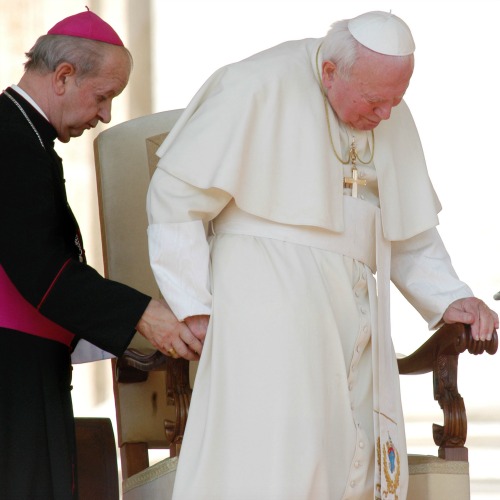Cardinal Dziwisz: Burning of JPII’s Letters Would Have Been Senseless
John Paul II’s former secretary explains his decision not to comply with the late pope’s request that his personal notes be burned following his death.

ROME — Cardinal Stanislaw Dziwisz addressed his controversial publishing of letters that John Paul II asked to be burned, affirming that the decision is prudent because the letters are “a good for humanity.”
“These writings were consigned for the process of beatification. They were delivered, examined by the commission,” Cardinal Dziwisz told CNA in an interview last month, adding that any “polemic” surrounding the situation “is senseless.”
The cardinal serves as archbishop of Krakow and was the secretary to and close friend of Blessed John Paul II for 40 years — both in Poland before the future pope was elected to the See of Peter and afterward for the entirety of his pontificate.
On the publication of personal notes which the former pope — who will be declared a saint on April 27 — explicitly asked in his will to be burned, Cardinal Dziwisz explained his decision, saying that “it would take a stupid man to burn everything just like that.”
“This is not just any old thing. … One just doesn’t burn these documents,” he said.
The collection of John Paul II’s personal notes have been complied by the cardinal into a book entitled I Am Very Much in God’s Hands, which was released Feb. 12 in Poland and contains religious meditations written from July 1962 until March 2003.
In response to the division of public opinion regarding the letters’ publication, Cardinal Dziwisz explained that although John Paul’s will asked for the notes to be burned, “one needs to divide these things: important documents and other little things that aren’t at all important.”
“This correspondence wasn’t like this,” he observed. “It was something very profound that could help other people to discover how to pray, how to love.”
“He had a very deep life, and he didn’t open it up very easily,” the cardinal reflected, referring to Blessed John Paul II, adding that “here, through these meditations, these writings, one can discover a little of his heart, his faith, his devotion, that which [he] carried inside himself."
Speaking of his relationship with the late pope, the cardinal emphasized that “he knew me. He knew to whom he left these things, who would take this responsibility.”
John Paul II also knew “how I sought to serve him with all my life close to him, serving with obedience on the one hand, but also prudence and responsibility,” he continued, affirming that he is being faithful to John Paul II’s wishes because “this is why he left them to me.”
“I did his will, not mine. … Imagine burning things of this type.”
Making the decision to keep the notes despite the request in the will was “difficult,” the cardinal expressed, noting that “I can’t say everything because that would make it seem like I was exaggerating.”
However, the cardinal repeated that between him and John Paul II, “there was great trust. He didn’t check up on me. He knew that I did what I had to do, because in this work there had to be great responsibility, trust and collaboration. If not, the service of a secretary is useless.”
Recalling other interviews in which he said that he “did not have the courage” to burn the letters, Cardinal Dziwisz revealed that this is true, because keeping them “is a good for humanity.”
“A pope who served for 27 years, who carried within himself many spiritual riches: These meditations are documents of his spiritual life, holy, given to the Church as an example that the life he led can be an example for everyone else.”
The Associated Press reported that there are also plans to publish the book in English and other languages, although there are no details as of yet. All proceeds from the book are to be given to assist in the building of a memorial museum in Krakow honoring the Polish pope, which the cardinal oversees.













